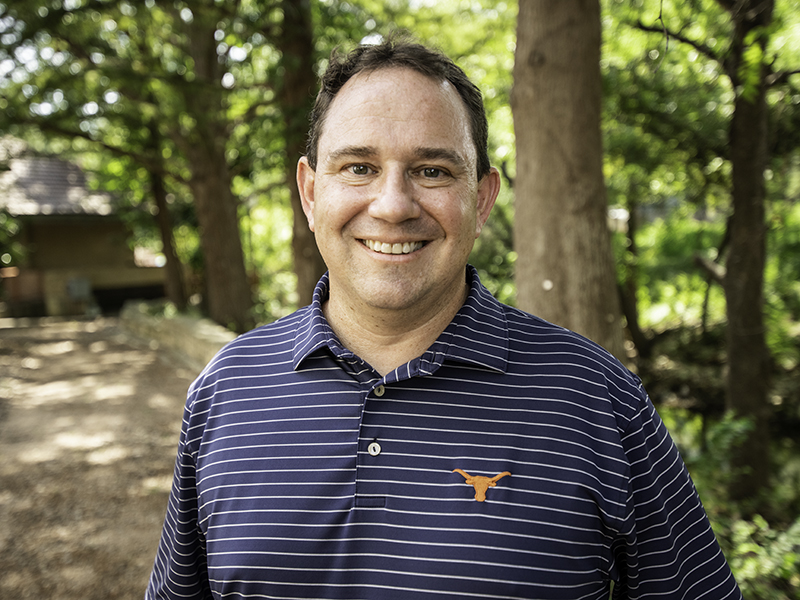While a staff member in The University of Texas at Austin’s Utilities and Energy Management division, alumnus Rusty Osborne (B.S. Botany 1975) devoted his 30-year career to making campus operations more sustainable. As a result of his efforts, the university saves a significant amount of energy, water and costs every year and has become a recognized energy efficiency leader among universities across the U.S.
Now in retirement, Osborne and his wife, fellow UT Austin alumna Cecilia Green (B.S. Botany 1979), are committed to developing our future leaders in green energy. With a generous $50,000 donation, the couple has established the Osborne Green Energy Endowed Excellence Fund to support the Cockrell School of Engineering’s Webber Energy Group in its mission to change the way the world thinks about energy by training the next generation of energy innovators and policy leaders.
Led by Michael Webber, associate professor in the Department of Mechanical Engineering, deputy director of the Energy Institute and co-director of the Clean Energy Incubator at the Austin Technology Incubator, the group brings together undergraduate and graduate students and professional researchers from a variety of disciplines to analyze and develop solutions to environmental and energy challenges. The group’s research has appeared in numerous national publications, including The New York Times, Forbes and The Washington Post, and frequently informs policy at the state and national levels.

In his group, Webber prioritizes building communication skills and an understanding of economic and policy considerations, in addition to honing his students’ technical expertise. The group will use the endowment’s distributions to support student leadership training by bringing in professional coaches, sending students to conferences to present their innovative research and taking trips to national labs and power plants to share research findings, learn new ideas and foster collaboration.
Osborne and Green hope to attract additional support for the endowment from fellow alumni and members of the community to expand the impact of their initial donation.
“The most important thing we can do for students is train them to be leaders,” Webber said. “Endowments like this one are essential because it allows us to give students those skills that round out their education. Rusty and Cecilia’s generosity will have a huge impact by empowering our students to share their innovative solutions and make a difference in our world.”
Osborne and Green fondly recall their experiences as botany students in UT Austin’s College of Natural Sciences, which cemented their passion for preserving the environment. By helping generations of students to create new technologies and become leaders in finding solutions that protect the environment, Osborne and Green hope their investment will create momentum for the sustainability movement and advance clean energy innovations at the university.
“Students are the ones who can really make an impact when it comes to creating and supporting sustainable solutions,” Osborne said. “Cecilia and I both feel that an increase in the development and deployment of renewable technologies will give humankind our best chance at buying time to avoid the worst of global climate change.”
After graduating from UT Austin, Osborne and Green became strong advocates for sustainability and conservation efforts throughout their careers.
Osborne joined the Utilities and Energy Management staff in 1980 and worked to improve the efficiency of campus operations. After learning that the university was purchasing treated drinking water to cool power generators, he led a team to develop a recovery method to collect non-potable water on campus.
Thanks to Osborne’s efforts, the university now recovers between 35-50 million gallons of once-through cooling water, ground water, air conditioning condensate and rainwater every year, accounting for about 8 percent of overall water use and about 15 percent of cooling water use. Osborne also coordinated the construction of campus infrastructure that allows cooling towers to use highly treated wastewater from the City of Austin, a resource which costs about 85 percent less than drinking water.
Green has worked as an environmental consultant for the past 35 years, helping individuals and companies comply with environmental regulations. She is currently a senior project manager for Blanton & Associates, a Texas-based environmental consulting firm, and previously worked for Atkins, an international engineering consulting firm, in a variety of roles such as senior vice president and energy integration director for North America. She previously served as president of the Atkins Foundation Board of Directors, and was a board member at PBS&J and the WTS foundation.
Osborne and Green reside outside of Austin, where they have created a home so energy efficient that they often receive negative energy bills. The couple’s two children share their passion for sustainability. Their son Robin earned his bachelor’s degree in civil engineering from the Cockrell School in 2010. He recently was certified as a professional engineer in Texas and is working as a traffic analyst for Kimley-Horn and Associates, a transportation design consulting firm. Their daughter Lauren is working toward her master’s degree in community and regional planning in UT Austin’s School of Architecture.
